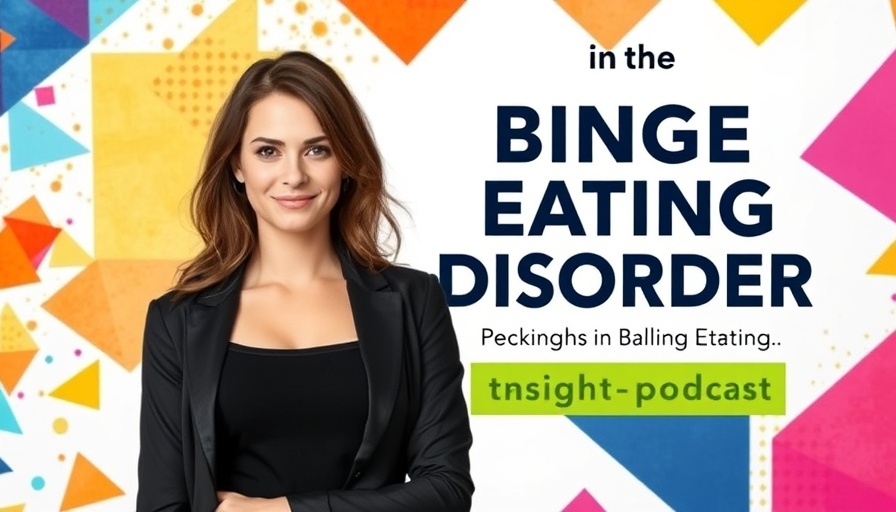
Understanding Binge Eating: An Emerging Mental Health Disorder
Binge eating has emerged as a significant concern in the realm of mental health, with increasing awareness about its complexities beyond mere overeating. The recent Health on Track podcast featuring Natassia D'Souza sheds light on this condition, differentiating it starkly from common emotional eating. Binge eating disorder involves consuming large quantities of food in a short time, often tied to deep emotional turmoil rather than physical hunger. As we dialogue about health and well-being, it's essential to decode the intricacies of binge eating and the stigma often attached to it.
In 'Ep 43 - Are You Binge Eating with Natassia D'Souza', the discussion dives into understanding binge eating as a complex emotional disorder, exploring key insights that sparked deeper analysis on our end.
The Spectrum of Eating Behaviors
Natasia clarifies that binge eating exists on a spectrum, contrasting it with emotional eating. Emotional eating may be a reaction to daily life situations—say, celebrating achievements or seeking comfort during tough times. In stark contrast, binge eating often involves intense feelings of guilt and shame following episodes where individuals consume excessive amounts of food secretly. This can lead to a cycle of bingeing and restrictive dieting, creating a tumultuous relationship with food.
Identifying Triggers: The Emotional and Environmental Contributors
One key takeaway from the podcast is the importance of understanding binge eating triggers. Emotional distress, environmental factors, and interpersonal dynamics can disproportionately affect those prone to this behavior. For instance, family gatherings during festive seasons often heighten stress levels, leading individuals to seek solace in food. Recognizing these triggers is crucial for developing a healthier relationship with food and oneself.
Recovery and Management: Ongoing Self-Awareness
Can binge eating be cured? The podcast emphasizes that while complete elimination of the disorder may not always be possible, individuals can learn to manage it effectively. Natassia provides insight into her personal journey, revealing that even when remnants of binge eating urge arise, self-awareness and coping strategies allow her to navigate challenges. Much like managing anxiety, developing a toolkit for emotional regulation can empower individuals battling binge eating disorders.
The Importance of Compassion and Self-Kindness
A vital element in managing binge eating is cultivating self-compassion. As highlighted in the podcast, after an episode, individuals often swing into self-criticism, resonating with feelings of failure. Instead of partaking in further restriction, giving oneself grace and understanding can foster an environment of healing. This process promotes growth, allowing those struggling to recognize their behaviors and their triggers, paving the way for healthier habits.
Redefining Relationships with Food: Practical Tips for Better Choices
Every changing demographic of individuals battling binge eating, especially professionals and educators, needs practical strategies. For instance, instead of labeling certain foods as off-limits, one can create a balanced approach that includes all food types mindfully. Natasia recommends reparenting ourselves—teaching our minds to respond differently when cravings hit. This includes recognizing emotional hunger versus physical hunger and asking empowering questions that lead to self-understanding.
Bringing Awareness to the Fundamental Conversation on Eating Disorders
Ultimately, the discourse surrounding binge eating requires an intersectional approach—integrating discussions of mental health, societal pressures, and cultural practices. Individuals struggling with this disorder often feel alienated or ashamed, and increased visibility can help bridge understanding and empathy. By sharing experiences and insights like those of Natassia's journey, we can foster a community where individuals feel less isolated and more capable of seeking help.
Taking Action: Understanding the Signs and Seeking Help
Recognizing binge eating as a mental health disorder is crucial in addressing it effectively. For professionals, educators, and expats who balance demanding lifestyles coupled with emotional stressors, the message is clear: you are not alone, and help is available. Engaging with mental health professionals, staying connected, and being proactive about one's health can lead to substantive change.
With increasing awareness about binge eating disorder, it's time to look beyond the surface and appreciate the complexities individuals face. If you or someone you know is navigating through binge eating challenges, reach out for support—this journey toward healing is indeed possible.
 Add Row
Add Row  Add
Add 




Write A Comment